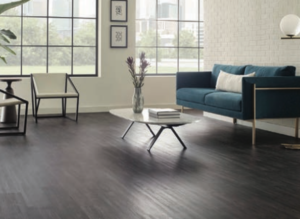 By Megan Salzano Originally sparked by the pandemic shutdowns in 2020, instability in ocean freight timelines and congested U.S. ports have caused an ongoing supply chain crisis that has impacted the industry for several months. The crisis has undercut efforts by retailers, suppliers and distributors to capitalize on the booming demand for flooring and is projected to continue throughout the next several months.
By Megan Salzano Originally sparked by the pandemic shutdowns in 2020, instability in ocean freight timelines and congested U.S. ports have caused an ongoing supply chain crisis that has impacted the industry for several months. The crisis has undercut efforts by retailers, suppliers and distributors to capitalize on the booming demand for flooring and is projected to continue throughout the next several months.
The crisis began with severe slowdowns in container ship arrivals to the U.S. as well as a shortage of available containers. In March, only about 40% of container ships globally were on time arriving at ports, with average delays stretching to more than six days, according to an analysis by Denmark-based Sea Intelligence. Today, the slowdowns remain behind reliability levels of the previous two years, when more than 70% of ships arrived on time, according to the analysis.
A major category that has been hit hard by the freight slowdowns and supply challenges is resilient. The segment has always been heavily imported—in 2020 the import piece of the resilient flooring pie actually grew to 81.5%, or $5.391 billion, despite ongoing talks related to reshoring efforts focused on the category.
The LVT subsegment of the resilient category, which in 2020 accounted for an estimated $4.25 billion in revenue just on the residential side of the business, has driven the category—and the industry—forward over the past several years. The SPC/WPC products in this sub-segment rely heavily on imports. As such suppliers, dealers and distributors have dealt with hefty challenges—both in acquiring the supply needed to meet the current demand and in assuaging consumer aggravation in extended timelines and costly changes.
“A contributing factor to these issues is the amount of growth the industry has seen,” Michael Boulant, owner, Affordable Flooring & More, Las Vegas, told FCNews. “We grew almost 70% in 2020 and are tracking significantly higher than that in 2021. This growth seems to be happening across the industry and the manufacturers cannot keep up. We make sure to tell customers up front about these issues, and that they are industry wide.”
Deb DeGraaf, co-owner, DeGraaf Interiors, Grand Rapids, Mich., echoed Boulant’s sentiments. “Our sales staff and designers are working overtime trying to keep up with demand—the amount of retail business we have seen in the past nine months has been astonishing. The product availability issues have caused many return trips to our showrooms to go through the reselection process. This essentially starts the selection process all over again for our staff causing time constraints on an already packed schedule.”
While supply issues have reverberated across categories, retailers note a greater challenge when it comes to resilient flooring in particular. “It continues to worsen,” said Sam Locher, vice president of business development and market- ing, A.J. Rose Carpets & Flooring, with several locations in the New England area. “It is probably the worst category for lead times due to production issues and container delays.”
While the LVT/SPC/WPC subsegment of the resilient category continues to grow by leaps and bounds despite ongoing supply chain challenges, suppliers and retailers alike have had to rethink their sales strategies.
Dealer directives

While an unexpected boom in business is always a welcome challenge, supply issues have compounded against the backdrop of growing demand. As such, flooring dealers across the U.S. have had to buckle down and make some hard decisions.
What has it come to in terms of upholding essential customer service requirements while navigating a tumultuous supply chain? For some, it’s all about inventory. “We have purchased more than six truckloads of inventory, so our clients have a broad range of products to choose from if their project has a time constraint,” DeGraaf said.
Brian Elias, owner of ReFloor, a shop-at-home hard surface flooring dealer servicing areas in Ohio and Michigan, also said stock is paramount. He noted that his business is 95% LVT, but he will not offer customers any product that he does not have readily available. “Although we are a shop-at-home company, we don’t send our reps out with anything that is not readily available,” he explained. “I will get a list of what everyone has in stock and those will be the only things I offer. Anything that is not already in this country, I’m not going to sell.”
Eric Mondragon, hard surface buyer for RC Willey Flooring Division, headquartered in Utah, said he also relies on the store’s vast inventory stores. “We stock over 3 million square feet of flooring products, so we usually have something that will work for our customers,” he said. “The plan is not to put the customer in an extended back-order situation unless it’s not an issue for them.”
Even for dealers who do not stock inventory, the strategy has become enticing. “We are not a stocking dealer; we have always relied on West Coast distribution—which generally gets material to our warehouse in one to two days,” Affordable Flooring & More’s Boulant said. “That is not necessarily the case anymore, so we’ve started stocking a few products so we can offer quick turnaround when necessary.”
Qualifying the customer is another key strategy many dealers today are utilizing to determine the best resilient products to promote and sell. “We always ask what their timeframe is like, but now it is a much bigger part of the conversation,” A.J. Rose’s Locher said. “We are asking customers if they are OK with waiting six-plus weeks, and if they are not, we are asking them to make multiple selections (option 1, option 2, option 3) if possible.”
For many flooring dealers, the strategy focuses on supplier/distributor relationships. For ReFloor’s Elias, for example, the company’s strategy of inventory-only sales stays in place regardless of promises from suppliers. “We are reaching out for stock levels from our suppliers on a weekly basis, and we are only selling what they have in stock,” he explained. “We’re not even taking their word for it when it comes to ‘Oh, we’re getting this in.’ Until it’s in, we assume it’s not in. They are all promising the world and not delivering on those promises. They don’t mean to—they’re also getting promises that aren’t coming to fruition. All the suppliers are running into the same problem. It’s how I handle the supplier that makes it go away. Shame on me if I don’t do that.”
For some dealers, it has even come to severing ties. “If you look at a large, national supplier, their lines are so broad [that you can offer your customer a bevy of options] vs. a local distributor that has eight or 10 colors,” said Kevin Coker, vice president of Just Carpets with three locations in the San Francisco Bay Area.
Coker said the store does a fair amount of WPC/SPC sales and has noticed the shortages have mostly affected his local distributors, which caused the store to rethink its partnerships. “We streamlined our product lines and moved over to the national brands that have factory relationships and the breadth of product and depth of inventory,” he explained. “Ultimately, we’ve pulled a lot of our business from our local distributors and gave it over to [larger, national suppliers].”
Supplier strategies

For suppliers, the supply chain challenges with supply have been just as daunting. Long lead times, rising costs and staggering misinformation have caused headaches across the board. However, several suppliers have implemented new strategies to help deal with the hardship, especially when it comes to the growing LVT category.
For many, it has meant investing in the supply chain to support the needs of their customers. “As always, our first priority is our customers,” said Herb Upton, vice president of residential product and channel management, Shaw Industries. “We’ve updated our tools and systems to include more real-time order tracking and to suggest alternative options to backordered products, when available. We’re closely monitoring all market dynamics and are committed to clear and transparent communication to our customers as the situation evolves.”
For Mohawk, investments have also been key, and the company has invested in its international supply chain efforts to drive product availability, according to Ed Sanchez, vice president of product management, resilient, Mohawk. “We have a number of new launches this year as we have refreshed both the SolidTech and Pergo lines. In preparation for this, we ordered a significant amount of product early to support it and have a steady flow planned. Additionally, we are continuing to make investments to expand our manufactured capacity to support our dealers. We have taken efforts to expand the production capacity of key programs like SolidTech Plus to help support our dealers as the industry works through these challenges.”
Doug Jackson, Cali president, noted the importance of key relationships when dealing with hardships. “Our close relationships forged over many years of collaboration with ocean cargo suppliers and our factories have paid off during these challenging times,” he told FCNews. “Cali is working very closely with key suppliers to ensure our customer demands are met and service commitments are exceeded.”
Then there is domestic production. Last year was the year of announcements, as several foreign and domestic suppliers talked of onshoring or expansion efforts particularly focused on LVT product supply. While the pandemic delayed—and even halted—these efforts, suppliers say domestic capabilities remain a constant focus. “Domestic product is critical in periods of supply chain disruption,” Mohawk’s Sanchez said. “As the lead time and cost of importing has gone up, it has created unreliable product availability for many dealers as well increased cost to serve. Having U.S.-made product enables companies like Mohawk to provide alternate options to our dealers to help them continue to serve their customers. Mohawk continues to make investments to add additional capacity to service our customers and shorten lead times. Through a focused effort on driving manufacturing efficiency and productivity to get more off of our existing lines as well as making investments in additional capacity we are focused on supporting our dealers.”
Sanchez noted that the industry will start to see more domestic capacity available in late 2021 and early 2022.
Shaw’s Upton added that diversification of supply has been a priority for the industry long before the recent challenges, and production has been greatly expanded throughout Asia as well as domestically. For Shaw, he said the company “will continue to invest in both domestic and contract manufactured resilient offerings, including domestic capacity from our vendor partners, to service the needs of our customers and the end-use consumer. We recently invested approximately $20 million to add to our existing SPC manufacturing capabilities at Plant RP in Ringgold, Ga.”

